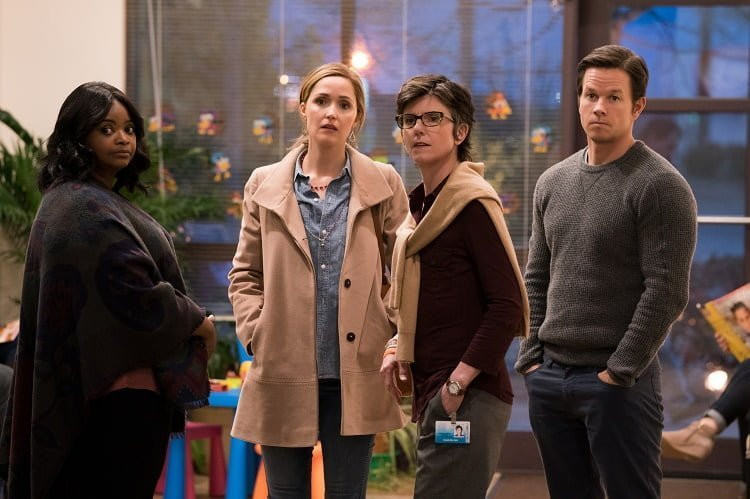Instant Family stands out as a remarkably genuine, humorous, and intelligent family comedy in recent years. This moving and delightful film masterfully blends witty dialogue and lighthearted comedy with a profound sense of realism and emotional depth. Director and co-writer Sean Anders, drawing from his own experiences as a foster parent, delivers Instant Family as a piece of thoughtful comedic entertainment that resonates deeply with audiences. Echoing the sincerity of John Hughes’ classics or Ron Howard’s Parenthood, Instant Family emerges as a truly pleasant surprise, not just of the holiday season, but of the year, largely thanks to its impeccable Instant Family Casting.
The story centers around Pete and Ellie Wagner (Mark Wahlberg and Rose Byrne), a happily married couple who have built successful careers renovating houses. Content with their achievements, they contemplate starting a family but worry about being older parents to a newborn. Ellie proposes adoption, leading them to explore foster care. After initial unsuccessful attempts to connect with younger children, they encounter Lizzy (Isabela Moner) at an adoption fair. Lizzy, a teenager, makes a strong impression, and Pete and Ellie learn that adopting Lizzy means also welcoming her two younger siblings: Juan (Gustavo Quiroz), a shy and anxious boy, and Lita (Julianna Gamiz), an adorable but sometimes volatile young girl. The Wagners agree to a trial period of foster parenting before committing to full adoption. As expected, parenting proves to be more challenging than anticipated. However, beyond navigating typical family crises, Pete and Ellie begin to understand the deep-seated needs, fears, and temperaments of these children, realizing that fostering these kids requires extraordinary love and patience.
Instant Family is a surprising departure for the director known for comedies like Sex Drive, That’s My Boy, and the Daddy’s Home series. Anders shifts away from the broad, often juvenile humor characteristic of his previous works, and instead creates a film that feels deeply personal and heartfelt. While the movie includes slapstick moments and humorous pop culture references (like a running joke about The Blind Side and Wahlberg’s character’s self-consciousness about adopting Latino children), Instant Family avoids feeling artificial or overly staged. Anders emphasizes the challenges of adoption, grounding the humor in relatable and realistic situations. Although not every comedic element perfectly aligns with this realism, it’s clear that Anders aimed for authenticity while ensuring the film remained engaging for a broad audience. Instant Family successfully balances entertainment with education about the realities of the adoption process.
The strength of Instant Family is significantly amplified by its exceptional cast. Each member of the Wagner family, from Pete and Ellie to the adopted children and extended relatives, is portrayed with depth and nuance by actors who clearly embrace Anders’ vision. Mark Wahlberg delivers one of his most endearing performances, utilizing his talent for playing a likeable, quick-witted character to embody Pete as the “cool parent.” Pete is depicted as someone who tends to avoid direct conflict, often gives in to his kids’ demands, and genuinely strives to connect with and understand them. Rose Byrne, consistently reliable, shines as Ellie, the initially confident worrywart who starts questioning her parenting abilities when faced with the children’s resistance and challenges. Julie Hagerty and Margo Martindale are perfectly cast as Byrne and Wahlberg’s mothers, respectively. Hagerty provides gentle comic relief, while Martindale delivers a surprisingly layered performance, culminating in a poignant and heartfelt revelation that stands out as one of the film’s most impactful moments, demonstrating the brilliance of the instant family casting choices.

Even the supporting roles of the child services liaisons, played by Octavia Spencer and Tig Notaro, are brilliantly realized. These characters, seemingly minor, offer insightful and subtly humorous portrayals of social workers genuinely dedicated to helping children from difficult backgrounds. The comedic chemistry between Spencer and Notaro—a pairing that proves unexpectedly delightful—is as compelling as that between Wahlberg and Byrne, another surprisingly effective duo brought together by the film’s instant family casting director. While these actors might seem overqualified for supporting roles, it’s impossible to imagine Instant Family without their contributions.
The cast of Instant Family wholeheartedly embraces Anders’ thematic intentions: to examine misconceptions about foster care with respect, humor, and intelligence. While the film includes universal comedic scenarios like toddler tantrums, teenage crushes, and bathroom sharing, it primarily focuses on the specific challenges and complexities of the adoption process. This focus on authentic experiences is what makes the instant family casting so crucial to the film’s success.
Pete, Ellie, and other prospective parents in their adoption agency begin the process with various preconceived notions about adoption, which Spencer and Notaro’s characters address and dismantle. Regardless of their backgrounds—successful couples like Pete and Ellie, same-sex couples, or religious individuals—they initially share the misconception that adopting an older child is easier than raising a biological child from infancy. They must learn that adoptive parenting presents unique and often more demanding challenges, as these children come with pre-existing emotional needs that require constant attention and understanding. These needs are not always immediately apparent, as adoptive parents haven’t been present from the child’s earliest years.
Anders commendably avoids portraying adoptive parents as saints or heroes in Instant Family. The film resists overly sentimental portrayals that might inspire impulsive adoption decisions, akin to adopting a pet from a shelter. Instead, it depicts adoptive parents as ordinary people striving to do their best in often challenging circumstances. If parenthood is considered one of the most demanding roles, adoptive parenting is likened to a specialized, high-stakes endeavor. While adoptive parents may celebrate milestones in their support group meetings, they also face significant setbacks and disappointments. The instant family casting ensures that these emotional highs and lows are portrayed authentically and powerfully.
In a script that is both insightful and well-acted, the children in Instant Family not only convincingly resemble siblings but are also written to highlight the diverse ways children process trauma, even within the same family. Lizzy, Juan, and Lita do not openly disclose their entire past to Pete and Ellie. Having experienced multiple placements within the foster care system, they have developed strong defense mechanisms rooted in low expectations. Lizzie exhibits typical teenage rebellion but also longs for her recovering addict birth mother, whose impending release from prison intensifies her adolescent angst. Having essentially raised her younger siblings, she also sees herself as an equal maternal figure to Ellie. Sensitive and accident-prone Juan becomes tearful and distressed whenever he makes mistakes or is reprimanded, reflecting anxieties stemming from his abusive past. Lita oscillates between sweetness and defiance, believing she can manipulate situations with tantrums. Instant Family handles these varied coping mechanisms with sensitivity, and the young actors deliver nuanced performances that are as thoughtful as those of their adult co-stars, further validating the excellent instant family casting.
Instant Family richly deserves praise for transforming a potentially sensitive and complex topic into a genuinely moving and impactful film. Anders and co-writer John Morris thoughtfully address the multifaceted issues of foster parenting. While they couldn’t cover every aspect of the process, Instant Family hopefully encourages viewers to reconsider their perceptions of adoption. Despite the writers’ background in more mainstream comedies, Instant Family demonstrates conviction and purpose, aiming to educate and entertain simultaneously. Instant Family is genuinely funny on its own merits, but its lasting appeal stems from its honesty and authenticity. It is undoubtedly the best family movie of the holiday season and a refreshing example of the genre, thanks in no small part to its thoughtful and effective instant family casting.
Instant Family opens in theaters everywhere on Friday, November 16, 2018.

